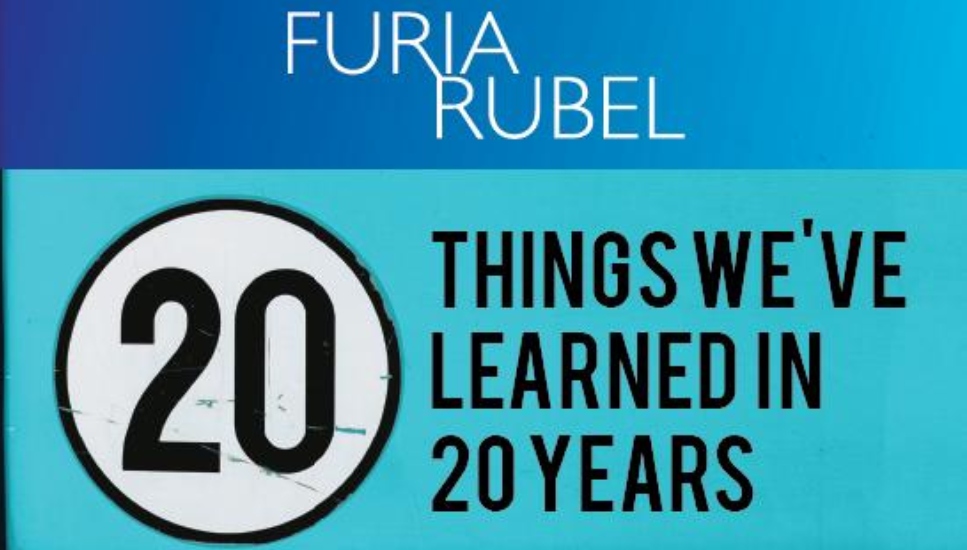20 Business Lessons from 20 Years to Apply Today!

By Gina Rubel
It’s hard to believe that it has been twenty years since I founded Furia Rubel Communications. That may seem like a long time, but it feels like it all began yesterday.
While there have been hundreds, if not thousands of lessons learned along the way, I decided to focus on 20 business lessons learned in 20 years to apply today since 2022 is the agency’s 20th Anniversary.
After practicing law for several years in Philadelphia, I moved to a farm with my husband in Bucks County, Pennsylvania. I was commuting three hours a day to Philadelphia which wasn’t sustainable with a young child at home, and I found myself looking for new opportunities away from litigation.
I was lucky to work in-house at a cable tech startup and then at a direct marketing agency where the idea of starting a PR agency with a niche in law firm marketing first took hold. Not long thereafter, Furia Rubel was born … and that was 2002.
Along the way, there have been many lessons learned, life-long relationships created incredible clients, and tons of work of which I am proud.
As I thought about the lessons I have learned, some that came to mind were the things I had to do to set up the business. That included hiring various people smarter than me: a savvy business lawyer, an honest and direct accountant, an executive coach, and a discrete bookkeeper. Launching the business required dedicating time to creating a solid infrastructure and systems while developing business, talent, and a pipeline.
One of the very first books I read, to which I still refer to new entrepreneurs, was The E-Myth Revisited by Michael Gerber. While these are things I did, they are not business lessons learned from 20 years that can be applied today.
The lessons learned collectively and individually at Furia Rubel come from years of listening, emulating, having confidence, taking risks, and learning from mistakes and successes alike.
Lessons On Innovation
- Consume information: To innovate, we need to consume as much data as possible. Conduct surveys, ask questions, do research, test, test, and test again, and collaborate with your internal teams and clients.
- Expand the definition of innovation: Don’t just think of innovations as the new technologies you plan to adopt. While that is a big component of innovation, it’s also a mindset. It’s how you approach the way you work with others and your corporate culture. If we learned anything from the pandemic, it’s that empathetic and authentic human resource management are required to innovate.
- Embrace that it all will be different tomorrow: Times are changing and to believe that what we do today will be the same tomorrow is simply incorrect. Public relations were so different when I started the agency. We didn’t think about SEO, social media, websites or website user interfaces, integrated communications, and so many other practices that go into effective communications. Think about it this way: in 2002 it was most effective to mail or fax a press release to a reporter, something I haven’t done in nearly 15 years.
- Nurture a culture of experimentation: Early in my career, I wrote an article about “Opportunities in Crisis.” It was about learning from challenges and mistakes. Nurturing a culture of experimentation is no different. To be successful, one must also make mistakes. What is important is to learn from those mistakes. Allow teammates to learn through trial and error as well. Foster a culture where there are no wrong ideas when brainstorming, where there is time to allow for trial and error so that you can course-correct, and stop resisting change.
Lessons On Leadership
- Lead by example and with integrity: I have always said that we must lead by example. For me, that means hiring freelancers and having them do work for the agency before they ever did work for a client. It means doing all the things we recommend to a client if they are the right things to do for corporate communications. It means taking time off from work and maintaining boundaries as a business leader. It means saying “no” when “no” is appropriate and it means always answering “why” before it is asked.
- Listen actively, have empathy and be human: One of the most difficult lessons for me has been to learn how to truly listen actively. This is still a work in progress because I get excited about the work we do and there is a constant flow of ideas in my head. When speaking with others, I need to control that flow so as not to interrupt others. I have learned to write those things down as they come to me, so I don’t forget them. I have learned to apologize if I interrupt and to confirm what I thought I heard. As for having empathy and being human, if you don’t understand what that means, ask the people around you or take a course in emotional intelligence. Remember that everyone’s life experience dictates how they communicate and how they interact with others.
- Take risks: If I had a dime for every time I said, “I’m risk-averse,” I’d be rich. Yet, I’ve taken a ton of risks leading Furia Rubel. I launched the business. I hired employees. I spoke to journalists. I launched a sub-brand, Media Source Guide, which failed miserably. Those are just some of the risks I’ve taken. However, to lead, one must be willing to be vulnerable, take constructive criticism, think creatively, innovate, and know that whatever the outcome, it will lead to deeper wisdom.
- Take responsibility for mistakes even when they’re not yours: As the leader of an organization, blame is something that cannot be placed on others. Always take responsibility for mistakes even when they are not yours.
Lessons On Effective Communications
- Accept that your business is not immune to crisis: Plan for a crisis and never say “never.” Every company will face some sort of crisis in its corporate lifetime. Some are less significant than others, however, the Covid-19 pandemic and exponential increase in natural disasters have proven that it’s imperative to be prepared with a crisis communications plan.
- Draft internal messages for external audiences: when you plan to send a message internally at your company, know that there are myriad ways for that same message to be shared with external audiences including the media. Just because you say it’s “confidential” doesn’t mean your employees will comply. Write every message as if it’s going to be plastered all over Times Square.
- Pause: There is power in pause, when speaking, when writing, when responding. Don’t fill silence with additional information. Pause and wait for the other person to speak. Pausing allows you to think and allows you to complete a thought without the need to say more.
- Pursue knowledge: No matter how much you think you know, there’s always more to learn.
Lessons On Inclusivity and Belonging
- Foster a diversity mindset: A diversity mindset means listening to and learning from people with different backgrounds, experiences, ages, and so many other factors. It means to live diversely and to listen to and benefit from various points of view. Fostering a diverse mindset is a way of life.
- Meet others where they are: Understand that there may be a limitation of resources and how this has changed over time. For instance, when communicating with a virtual staff or customers, it’s important to know if they have access to technology, if they have updated technology, and how they need to be communicated with.
- Remember that words matter: Take time to learn how to communicate with others in a way that is inclusive and not offensive. This is an ongoing process. This means learning about racist language and its origins. It means understanding how to properly use pronouns in gender communications. It means being mindful of microaggressions, ageism, and so much more.
- Seek diverse points of view: Your life experience is yours alone and the information you consume likely corresponds with your points of view. This is precisely why some people watch the BBC while others watch Fox News. In fact, social media platforms are programmed to feed you more of what you already consume. As a result, it is your job to seek out diverse points of view. Read opposing articles. Ask people about their views and why. Learn why some have strong feelings about the social issues that affect them while others do not. As you listen, you will certainly learn and foster a more inclusive environment that creates a sense of belonging in all.
For more, see Furia Rubel’s DE&I RESOURCE CENTER.
Lessons On Growth and Business Development
- Talk to strangers: LinkedIn is successful as a networking platform for a reason; it allows us to “talk to strangers” easily. Talking to people you don’t know is a large part of growing a business. At our agency, it means networking in person and virtually, interviewing guests on podcasts, seeking new opinions for articles and blogs, and capitalizing on introductions to people we don’t otherwise know.
- End unhealthy relationships: Throughout my career, I have learned to end unhealthy relationships with clients, prospective clients, business associates and others. This doesn’t mean those relationships are “bad,” it simply means that we’re not the right fit. The analogy I always use is that of dating. Sometimes, it takes a few encounters to determine if the relationship is or is not a good fit. Once you figure that out, learn healthy ways to move on without burning bridges.
- Accept that value is determined by the recipient of your products or services: During 2020, I participated in a training program on pricing one’s services with Blair Enns. His “Win Without Pitching” program is one of the best I’ve taken in my corporate career. Simply put, he explained that value is determined by the recipient of our products or services. Do not attempt to work with or sell to companies or individuals who do not see the same value as you.
- Turn down the wrong business: Turning down the wrong business is as valuable as accepting the right business. In year three of my journey as a CEO, my executive coach taught me that “no” is a one-word sentence. Learn when to say “no.” If it doesn’t feel right, then it probably isn’t. In business-to-business relationships, have a client evaluation tool that allows you to assess where it is best to spend your time. Turning down the wrong business will allow you to focus your time on attracting all the right business.
Bonus Lesson: Learn to manage up. This is a concept that was taught to me early in my career which I wrote about in 2019. The blog is worth reading as you can manage up effectively at any stage in your corporate journey.
Finally, and most importantly, ENJOY THE RIDE!
_____________

Gina Rubel is called on by corporate and law firm leaders for high-stakes public relations, reputation management, crisis communications and incident response support, including high profile litigation media relations. As the CEO of Furia Rubel Communications, she leads the law firm marketing agency to support professional service firms with integrated marketing, public relations, strategic planning, and content marketing. Contact her at Gina@FuriaRubel.com or @GinaRubel.
.
.
Connect With Your Community
Subscribe for stories that matter!
"*" indicates required fields





























